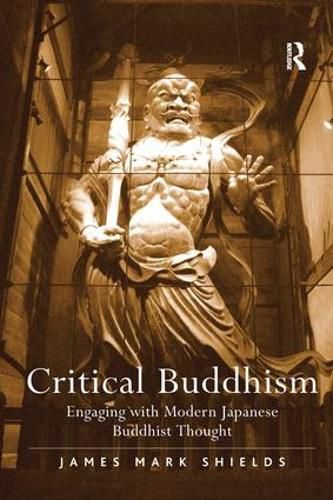Readings Newsletter
Become a Readings Member to make your shopping experience even easier.
Sign in or sign up for free!
You’re not far away from qualifying for FREE standard shipping within Australia
You’ve qualified for FREE standard shipping within Australia
The cart is loading…






In the late 1980s and early 1990s, the relative calm world of Japanese Buddhist scholarship was thrown into chaos with the publication of several works by Buddhist scholars Hakamaya Noriaki and Matsumoto Shiro, dedicated to the promotion of something they called Critical Buddhism (hihan bukkyo). In their quest to re-establish a true - rational, ethical and humanist - form of East Asian Buddhism, the Critical Buddhists undertook a radical deconstruction of historical and contemporary East Asian Buddhism, particularly Zen.
While their controversial work has received some attention in English-language scholarship, this is the first book-length treatment of Critical Buddhism as both a philosophical and religious movement, where the lines between scholarship and practice blur. Providing a critical and constructive analysis of Critical Buddhism, particularly the epistemological categories of critica and topica, this book examines contemporary theories of knowledge and ethics in order to situate Critical Buddhism within modern Japanese and Buddhist thought as well as in relation to current trends in contemporary Western thought.
$9.00 standard shipping within Australia
FREE standard shipping within Australia for orders over $100.00
Express & International shipping calculated at checkout
In the late 1980s and early 1990s, the relative calm world of Japanese Buddhist scholarship was thrown into chaos with the publication of several works by Buddhist scholars Hakamaya Noriaki and Matsumoto Shiro, dedicated to the promotion of something they called Critical Buddhism (hihan bukkyo). In their quest to re-establish a true - rational, ethical and humanist - form of East Asian Buddhism, the Critical Buddhists undertook a radical deconstruction of historical and contemporary East Asian Buddhism, particularly Zen.
While their controversial work has received some attention in English-language scholarship, this is the first book-length treatment of Critical Buddhism as both a philosophical and religious movement, where the lines between scholarship and practice blur. Providing a critical and constructive analysis of Critical Buddhism, particularly the epistemological categories of critica and topica, this book examines contemporary theories of knowledge and ethics in order to situate Critical Buddhism within modern Japanese and Buddhist thought as well as in relation to current trends in contemporary Western thought.